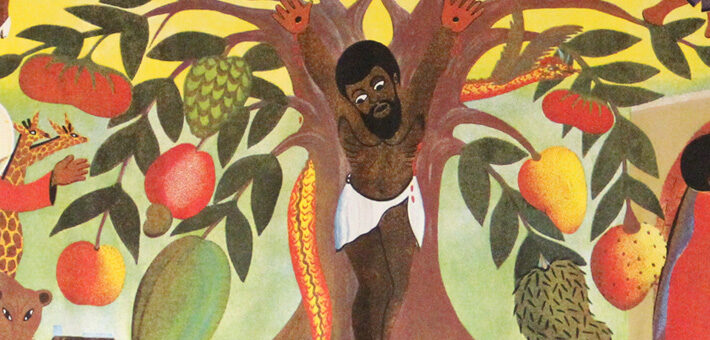Commentary on Luke 1:68-79
The author of Luke-Acts was a master storyteller.
Writing for a Greek-speaking audience, he communicated the good news of Jesus Christ in a style reminiscent of the Greco-Roman epic. Replete with heroes and heroic acts, miraculous events, interesting characters, drama and suspense, the Gospel of Luke and the Acts of the Apostles together form one grand narrative that links the story of Jesus’ life, death and resurrection to the story of how Christianity began.
In epic style, Luke 1-2 recount not one, but two angelic visits, two outlandish birth announcements, two miraculous births (one to a virgin, the other to an elderly, barren woman), the arrival of a baby prophet and an infant Messiah, two circumcisions, and the fulfillment of ancient prophecy and expectation. As if that isn’t enough, the narrative is interspersed with three major arias or canticles.
In the first, the Magnificat, Mary breaks into a song of praise and awe and even revolution upon seeing the pregnant Elizabeth. Drawing on the words of her biblical ancestor Hannah (1 Samuel), the girl-mother demonstrates that she has moved from puzzlement over her situation to deep understanding; she sees herself at the center of salvation history and embraces this new role.
The second canticle, Luke 1:68-79 or the Benedictus, occurs when the mute Zechariah and Elizabeth bring their newborn son to be circumcised eight days after his birth. When asked what the child will be called, Zechariah asks for a piece of paper and writes the name “John.” Suddenly, his ability to speak returns and Zechariah bursts into a canticle of blessing beginning with the familiar phrasing, “Blessed be the Lord God of Israel … ”
The third canticle, the Nunc Dimittis (“Now let your servant go …”) found in Luke 2:29-32, also occurs at a circumcision as Mary and Joseph bring Jesus to be circumcised at the Temple on the eighth day. When the elderly Simeon, whom the Holy Spirit had assured would not die before seeing the Messiah, sees the child, he sings this canticle of praise as a fitting conclusion to Act 1 — the birth of a Messiah.
The language of blessing
Though the words of Zechariah’s canticle or aria, the Benedictus in Luke 1:68-79, are familiar from scripture and liturgy, we rarely step back to consider more precisely what Zechariah is doing when he uses this ancient blessing formula. In the Psalms and other poetic texts, the language of blessing is often used in parallel with praise or gratitude making it almost seem as if the language of blessing is just another way of expressing either of these sentiments. See, for example, Psalm 34:1: “I will bless the Lord at all times; his praise shall continually be in my mouth;” or Psalm 145:2: “Every day I will bless you, and praise your name for ever and ever.” This, at first glance, would make sense of Zechariah’s opening words, “Blessed be the Lord God of Israel …” in the context in which he says them, praise at the birth and circumcision of his son.
But looking more closely at its use throughout the biblical text, the verb “to bless” or the noun “blessing” seem to be more than just synonyms for praise or gratitude, in part because they function differently. The language of praise, for example, moves in one direction: from humans toward God. This kind of praise is imbued with a sense of awe, wonder and reverence that can only be directed toward God. Praising God is often connected with who God is or what God has done, with that which already exists or has occurred.
Blessing, on the other hand, is more flexible — people can bless each other, God can bless people or things (animals, land, etc.), and people can bless God. And unlike praise, blessing often takes place before something happens or comes into being. In Genesis 12 for example, God tells Abraham to get up and go, to leave his country and his people and then, before Abraham has even taken his first step or responded in any way, God says “I will make of you a great nation, and I will bless you, and make your name great, so that you will be a blessing. I will bless those who bless you, and the one who curses you I will curse; and in you all the families of the earth shall be blessed.” In our own lives, we often bless our food before we even take the first bite, as in “Let these gifts to us be blessed … ”
More than a wish or an expression of hope, the language of blessing is grounded in certainty. When God blesses humans, God is making a promise — a statement of assurance — that what God has said, God will do. Whether it’s rain, a good harvest, or many children, God first blesses and then brings the blessing to fruition. This happens from the very first time the word “bless” is used in the Hebrew Bible in Genesis 1:22. God first blesses the creatures of the sea and the birds of the air and then commands them to be fruitful and multiply (which they ultimately do).
Zechariah’s blessing
When humans bless God, as Zechariah does in the Gospel of Luke, they are also making a statement, but theirs is one of confidence, conviction, and even recognition that God acts or is about to act. Zechariah doesn’t just hope that God will bring about the salvation of God’s people, he knows that it’s upon them even though both John and Jesus are still infants.
Blessed be the Lord God of Israel,
for he has looked favourably on his people and redeemed them.
He has raised up a mighty saviour for us …
Zechariah knows that even though the time between blessing and fulfillment can be long and difficult, God ultimately keeps God’s word:
Thus he has shown the mercy promised to our ancestors,
and has remembered his holy covenant,
the oath that he swore to our ancestor Abraham,
to grant us that we, being rescued from the hands of our enemies,
might serve him without fear, in holiness and righteousness
before him all our days.
Zechariah knows that his newborn son will soon play a role in bringing God’s blessing into the world:
And you, child, will be called the prophet of the Most High;
for you will go before the Lord to prepare his ways,
to give knowledge of salvation to his people …
And Zechariah blesses the Lord, the God of Israel in his old age, because he knows that:
By the tender mercy of our God,
the dawn from on high will break upon us,
to give light to those who sit in darkness and in the shadow of death,
to guide our feet into the way of peace.


November 20, 2016